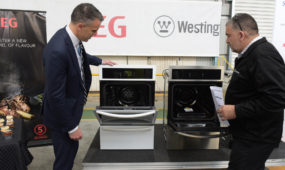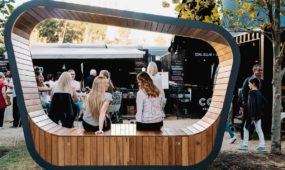Second-generation strand woven bamboo technology allows any type of timber to be used
Manufacturing
ADVANCED materials scientists have developed a technique to make softwood tougher than hardwood, and build in UV and termite protection.

Sign up to receive notifications about new stories in this category.
Thank you for subscribing to story notifications.
The Flinders Centre for NanoScale Science & Technology in South Australia is working with the Australian company 3RT to advance the concept of strand woven bamboo (itself an Australian invention), which is now a common flooring material around the world.
3RT was formed to commercialise the research and the South Australian Government has provided $1 million to help the company develop a trial plant at Mount Gambier in the southeast of South Australia.
The process – known as lignocellulose manufacturing technology – glues together offcuts of wood and then compresses them to create a new product that is denser, harder and more durable than the original and has greater aesthetic appeal.
Strand woven bamboo, which was commercialised in China in 2006, achieves 2900 on the Janka Hardness Scale, compared with 1910 for jarrah and 1180 for hard maple or natural bamboo.
The second-generation technology can attain the same with virtually any type of timber and allows for cost-effective manufacturing in high-labor cost countries.
“It is truly unique because it can transform timber waste or young plantation timber into products with both the visual appeal and the technical properties of tropical hardwood,” said 3RT’s managing director, Peter Torreele. “In addition, the products are termite resistant and fire retardant.”
These extra properties come courtesy of the nantotechnology and polymer science skills of Prof David Lewis and his colleagues at Flinders. The same techniques allow them to create treated pine without the use of copper chromium arsenate. Importantly, the resin used in the new manufacturing process is also environmentally friendly.
“The different process and different woods demanded a different resin to the what’s commonly used with bamboo and we were able to develop our technology around a water-based alternative,” Prof Lewis said.
Prof Lewis was an advisor to the company behind the first-generation technology and immediately could see the potential to do more.
“We had ideas to do it differently technically and to design a new manufacturing process around it that would be economical in Australia,” he said. “We’ve come up with a range of manufacturing options where you don’t need as many people to do it and it’s more efficient and gives better quality control.”
The potential is to use small logs, rejects and early clearings from plantations to create hard timber products, rather than chipping them to create less useful chipboard, particleboard or MDF. The key to strand woven technology is that there is fibre the entire length of the product, which provides both the mechanical properties and the aesthetics.
Negotiations are underway with potential partners, with a view to commercial production beginning next year. There is already significant international interest, with companies from around the world sending wood samples for testing as part of the development process.
Jump to next article



